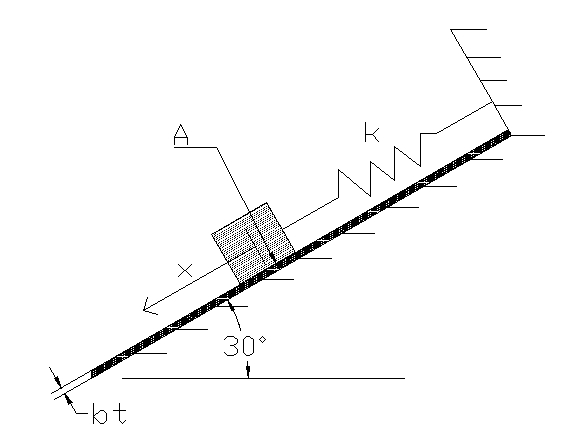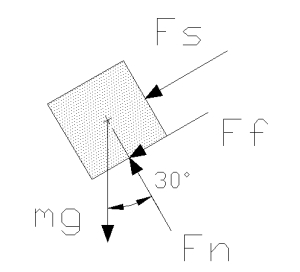Brandon.plubell 05:44, 26 October 2009 (UTC)
Under-Damped Mass-Spring System on an Incline
Part 1 - Use Laplace Transformations
Problem Statement
Find the equation of motion for the mass in the system subjected to the forces shown in the Free Body Diagram (FBD). The inclined surface is coated in SAE 30 oil.
Initial Conditions and Values
- A is the area of the box in contact with the surface
- g is the gravitational acceleration field constant
- bt is the thickness of the fluid covering the inclined surface
- μ is the viscosity constant of the fluid;
- m is the mass of the box
- k is the spring constant






Let the initial conditions be:


Force Equations
The sum of the moments in the x direction yields the equatiom


Where


To make the algebra easier, let

Then, from the sum of forces equation:


Laplace Transform



If we let  be 0 and rearrange the equation,
be 0 and rearrange the equation,


This is the transfer function that will be used in the Bode plot and provide valuable information about the system.

Inverse Laplace Transform
Since the Laplace Transform is a linear transform, we need only find three inverse transforms. All of the these have complex roots, since  . Because I am not yet comfortable finding the inverse with complex roots by hand, I used a laplace transform program for the TI-89.
. Because I am not yet comfortable finding the inverse with complex roots by hand, I used a laplace transform program for the TI-89.
![{\displaystyle {\mathcal {L}}^{-1}\left\{{\frac {1}{s\left(s^{2}+{\frac {\lambda }{m}}\,s+{\frac {k}{m}}\right)}}\right\}=e^{{\frac {-1}{6}}\,t}\,\left[{\frac {-9}{40}}\cos {\left({\frac {{\sqrt {159}}\,t}{6}}\right)}-{\frac {3\,{\sqrt {159}}}{2120}}\,\sin {\left({\frac {{\sqrt {159}}\,t}{6}}\right)}\right]+{\frac {9}{40}}}](https://wikimedia.org/api/rest_v1/media/math/render/svg/ad5b36ffaeed40fa94940fc3806855bf6dfc2c1f)
![{\displaystyle {\mathcal {L}}^{-1}\left\{{\frac {s}{s^{2}+{\frac {\lambda }{m}}\,s+{\frac {k}{m}}}}\right\}=e^{{\frac {-1}{6}}\,t}\,\left[\cos {\left({\frac {{\sqrt {159}}\,t}{6}}\right)}-{\frac {\sqrt {159}}{159}}\,\sin {\left({\frac {{\sqrt {159}}\,t}{6}}\right)}\right]}](https://wikimedia.org/api/rest_v1/media/math/render/svg/d90e51f054b7c54ff4b69ae0633d56cb495a573f)
![{\displaystyle {\mathcal {L}}^{-1}\left\{{\frac {1}{s^{2}+{\frac {\lambda }{m}}\,s+{\frac {k}{m}}}}\right\}=e^{{\frac {-1}{6}}\,t}\,\left[{\frac {2\,{\sqrt {159}}}{53}}\,\sin {\left({\frac {{\sqrt {159}}\,t}{6}}\right)}\right]}](https://wikimedia.org/api/rest_v1/media/math/render/svg/c1731acd225206c4d8f16cfc653ed27c8ff80761)
Equation of Motion
Putting it all back together again gives,
![{\displaystyle x(0)=g\,\sin {\theta }\,\left(e^{{\frac {-1}{6}}\,t}\,\left[{\frac {-9}{40}}\cos {\left({\frac {{\sqrt {159}}\,t}{6}}\right)}-{\frac {3\,{\sqrt {159}}}{2120}}\,\sin {\left({\frac {{\sqrt {159}}\,t}{6}}\right)}\right]+{\frac {9}{40}}\right)}](https://wikimedia.org/api/rest_v1/media/math/render/svg/3724523197328bf046c3a26ae25c2028b16e88f0)
![{\displaystyle +\,x(0)\,\left(e^{{\frac {-1}{6}}\,t}\,\left[\cos {\left({\frac {{\sqrt {159}}\,t}{6}}\right)}-{\frac {\sqrt {159}}{159}}\,\sin {\left({\frac {{\sqrt {159}}\,t}{6}}\right)}\right]\right)}](https://wikimedia.org/api/rest_v1/media/math/render/svg/34642856c90fb65543d042f271e79c328bd5ed01)
![{\displaystyle +\left({\dot {x}}(0)+{\frac {\lambda }{m}}\,x(0)\right)\,\left(e^{{\frac {-1}{6}}\,t}\,\left[{\frac {2\,{\sqrt {159}}}{53}}\,\sin {\left({\frac {{\sqrt {159}}\,t}{6}}\right)}\right]\right)}](https://wikimedia.org/api/rest_v1/media/math/render/svg/96d23bac6963eb06bfd0d313ddaaac192b7a152e)
Part 2 - Final and Initial Value Theorems
Initial Value Theorem
Final Value Theorem
Part 3 - Bode Plot
Part 4 - Breakpoints and Asymptotes on Bode Plot
Part 5 - Convolution

























![{\displaystyle {\mathcal {L}}^{-1}\left\{{\frac {1}{s\left(s^{2}+{\frac {\lambda }{m}}\,s+{\frac {k}{m}}\right)}}\right\}=e^{{\frac {-1}{6}}\,t}\,\left[{\frac {-9}{40}}\cos {\left({\frac {{\sqrt {159}}\,t}{6}}\right)}-{\frac {3\,{\sqrt {159}}}{2120}}\,\sin {\left({\frac {{\sqrt {159}}\,t}{6}}\right)}\right]+{\frac {9}{40}}}](https://wikimedia.org/api/rest_v1/media/math/render/svg/ad5b36ffaeed40fa94940fc3806855bf6dfc2c1f)
![{\displaystyle {\mathcal {L}}^{-1}\left\{{\frac {s}{s^{2}+{\frac {\lambda }{m}}\,s+{\frac {k}{m}}}}\right\}=e^{{\frac {-1}{6}}\,t}\,\left[\cos {\left({\frac {{\sqrt {159}}\,t}{6}}\right)}-{\frac {\sqrt {159}}{159}}\,\sin {\left({\frac {{\sqrt {159}}\,t}{6}}\right)}\right]}](https://wikimedia.org/api/rest_v1/media/math/render/svg/d90e51f054b7c54ff4b69ae0633d56cb495a573f)
![{\displaystyle {\mathcal {L}}^{-1}\left\{{\frac {1}{s^{2}+{\frac {\lambda }{m}}\,s+{\frac {k}{m}}}}\right\}=e^{{\frac {-1}{6}}\,t}\,\left[{\frac {2\,{\sqrt {159}}}{53}}\,\sin {\left({\frac {{\sqrt {159}}\,t}{6}}\right)}\right]}](https://wikimedia.org/api/rest_v1/media/math/render/svg/c1731acd225206c4d8f16cfc653ed27c8ff80761)
![{\displaystyle x(0)=g\,\sin {\theta }\,\left(e^{{\frac {-1}{6}}\,t}\,\left[{\frac {-9}{40}}\cos {\left({\frac {{\sqrt {159}}\,t}{6}}\right)}-{\frac {3\,{\sqrt {159}}}{2120}}\,\sin {\left({\frac {{\sqrt {159}}\,t}{6}}\right)}\right]+{\frac {9}{40}}\right)}](https://wikimedia.org/api/rest_v1/media/math/render/svg/3724523197328bf046c3a26ae25c2028b16e88f0)
![{\displaystyle +\,x(0)\,\left(e^{{\frac {-1}{6}}\,t}\,\left[\cos {\left({\frac {{\sqrt {159}}\,t}{6}}\right)}-{\frac {\sqrt {159}}{159}}\,\sin {\left({\frac {{\sqrt {159}}\,t}{6}}\right)}\right]\right)}](https://wikimedia.org/api/rest_v1/media/math/render/svg/34642856c90fb65543d042f271e79c328bd5ed01)
![{\displaystyle +\left({\dot {x}}(0)+{\frac {\lambda }{m}}\,x(0)\right)\,\left(e^{{\frac {-1}{6}}\,t}\,\left[{\frac {2\,{\sqrt {159}}}{53}}\,\sin {\left({\frac {{\sqrt {159}}\,t}{6}}\right)}\right]\right)}](https://wikimedia.org/api/rest_v1/media/math/render/svg/96d23bac6963eb06bfd0d313ddaaac192b7a152e)